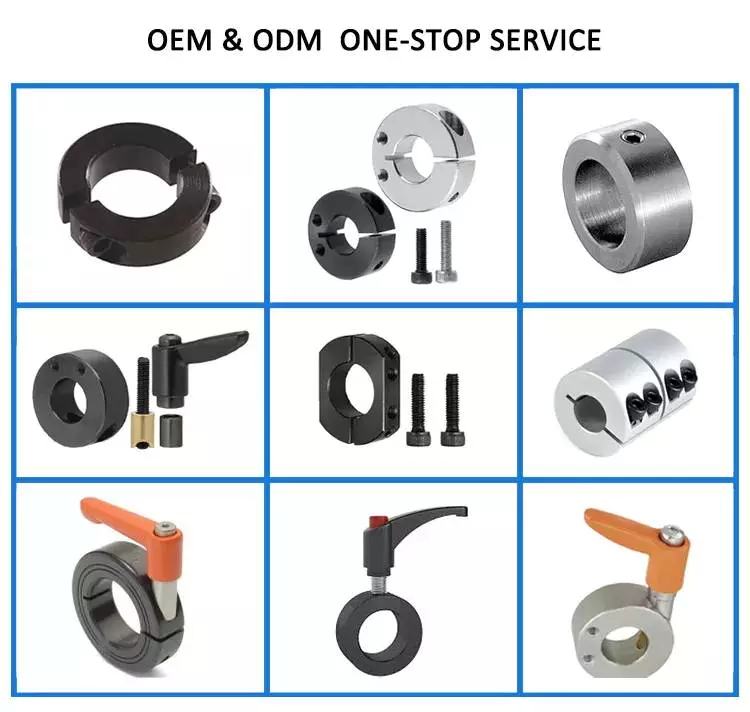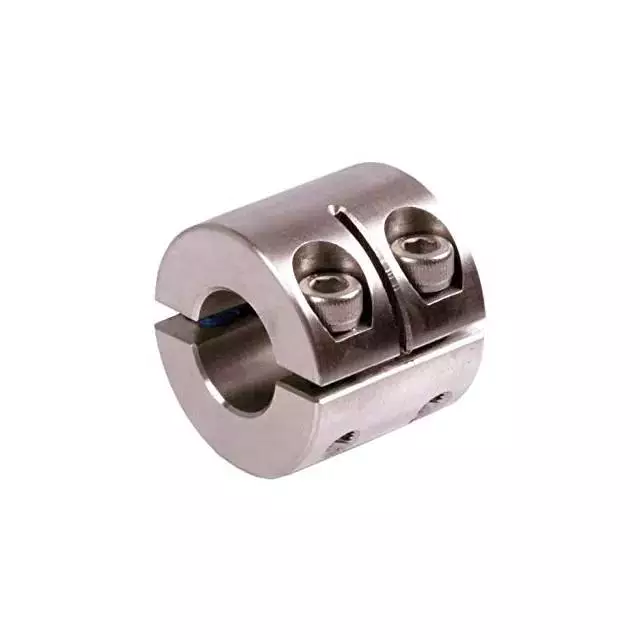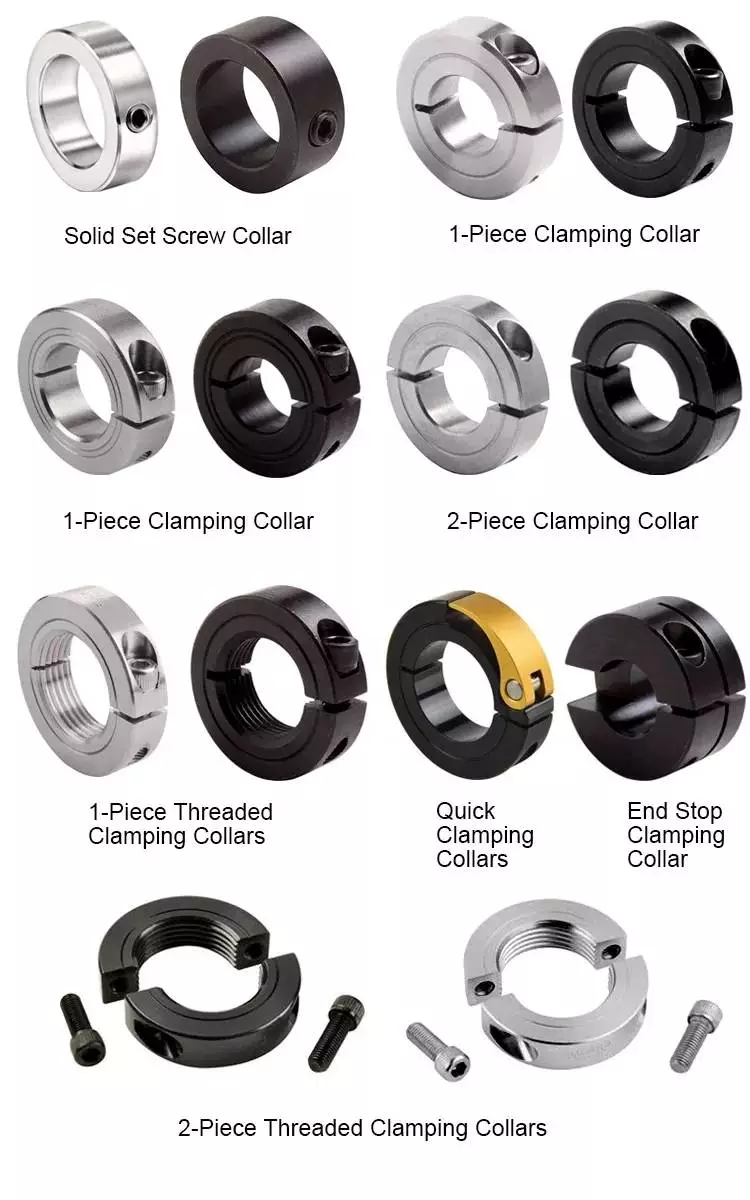Are there guidelines on selecting shaft collars for applications with varying loads?
Yes, there are guidelines available to help in selecting shaft collars for applications with varying loads. When choosing shaft collars, it is important to consider the expected load conditions to ensure proper performance and prevent failures. Here are some guidelines to consider:
- Load Capacity Ratings: Shaft collars are typically assigned load capacity ratings by manufacturers. These ratings indicate the maximum load that a collar can withstand without deformation or failure. When selecting shaft collars for applications with varying loads, it is important to choose collars with load capacity ratings that exceed the maximum expected load in the application. This provides a safety margin and ensures reliable performance even under fluctuating load conditions.
- Dynamic Load Considerations: In applications with varying loads, it is important to consider both the static and dynamic load conditions. Static load refers to the constant load applied to the shaft collar, while dynamic load refers to the fluctuating or cyclic loads. The dynamic load can be higher than the static load due to factors such as vibrations, impacts, or operational variations. Ensure that the selected shaft collars have sufficient dynamic load capacity to handle the varying loads without premature failure.
- Material Strength: The material strength of the shaft collar is a critical factor in load-bearing capacity. Different materials, such as steel, stainless steel, aluminum, or plastic, have varying strength properties. For applications with varying loads, consider selecting shaft collars made from materials with higher strength and fatigue resistance to ensure they can withstand the load fluctuations without experiencing permanent deformation or fatigue failure.
- Design Features: Certain design features of shaft collars can enhance their load-bearing capacity and performance. For example, collars with a wider width or thicker cross-section can provide greater strength and resistance against deformation. Additionally, collars with multiple set screws or clamping mechanisms can distribute the load more evenly and provide a secure grip on the shaft, reducing the risk of slippage or misalignment under varying loads.
- Consulting with Manufacturers or Engineers: If you have specific application requirements or complex load conditions, it is advisable to consult with shaft collar manufacturers or mechanical engineers. They can provide expert guidance and recommend suitable collar designs, materials, and sizes based on the specific load variations in your application. Manufacturers often have engineering support teams that can assist in selecting the appropriate shaft collars for varying load conditions.
Remember that the selection of shaft collars for applications with varying loads should be based on a thorough understanding of the load characteristics, anticipated load range, and the specific requirements of the application. It is essential to choose collars that can safely and reliably handle the maximum expected loads to ensure optimal performance and prevent premature failure.
Where can I find information on the materials used in manufacturing shaft collars?
If you are looking for information on the materials used in manufacturing shaft collars, there are several sources where you can find relevant information. Here are some common resources to consider:
- Manufacturer Websites: Many manufacturers of shaft collars provide detailed information about the materials they use in their product specifications or technical datasheets. Visiting the websites of specific collar manufacturers and exploring their product documentation or resources section can help you find information about the materials used in their collars. This information may include the type of material (such as steel, stainless steel, aluminum, or plastic) and any specific properties or characteristics associated with the material.
- Product Catalogs and Brochures: Manufacturers often publish product catalogs or brochures that provide an overview of their collar offerings. These catalogs may include information about the materials used in manufacturing the collars. You can request catalogs from manufacturers directly or check their websites for downloadable versions. The catalogs may highlight the material properties and advantages of using specific materials for different applications.
- Material Databases: Online material databases or directories can be valuable resources for finding information about specific materials used in manufacturing shaft collars. These databases typically provide comprehensive information about various materials, including their composition, mechanical properties, corrosion resistance, temperature tolerance, and other relevant characteristics. Examples of such databases include MatWeb, Engineering Toolbox, or specialized materials databases maintained by industry organizations or universities.
- Technical Standards and Specifications: Technical standards and specifications related to mechanical components can often include information about the materials used in their construction. Standards organizations or industry associations may release documents that outline the material requirements for shaft collars or provide guidelines for material selection. Accessing these standards or specifications can provide insights into the recommended materials for shaft collar manufacturing.
- Consulting with Manufacturers or Suppliers: If you have specific questions about the materials used in manufacturing shaft collars, reaching out directly to manufacturers or suppliers can be beneficial. They can provide detailed information about the materials they use, including their composition, properties, and any specific treatments or coatings applied to enhance performance. Contacting manufacturers or suppliers allows for direct communication and the opportunity to address any specific concerns or requirements you may have.
When seeking information on materials used in shaft collar manufacturing, it is important to consider factors such as desired properties (e.g., strength, corrosion resistance), environmental compatibility, and application-specific requirements. This will help you make informed decisions about selecting shaft collars that are suitable for your specific needs and operating conditions.
What are the key features to consider when selecting shaft collars for specific machinery?
When selecting shaft collars for specific machinery, there are several key features to consider. These features help ensure that the chosen shaft collars are compatible with the machinery and can perform effectively in the intended application. Here are the key features to consider:
- Shaft Size and Material: The first consideration is the size and material of the shaft. Shaft collars are available in various sizes to accommodate different shaft diameters. It is crucial to accurately measure the shaft diameter and choose a collar that matches it. Additionally, consider the material of the shaft, such as steel, stainless steel, or aluminum, and select a collar material that is compatible with it to prevent galvanic corrosion or other compatibility issues.
- Collar Material: Shaft collars are available in different materials, including steel, stainless steel, aluminum, and plastic. The choice of collar material depends on factors such as the application environment, load requirements, and desired durability. For example, stainless steel collars are often preferred for corrosive or high-temperature environments, while plastic collars may be suitable for lighter-duty applications or situations where avoiding marring or scratching the shaft is important.
- Collar Type: Consider the type of collar that best suits the specific machinery and application. The common collar types include set screw collars, clamping collars, one-piece solid collars, two-piece split collars, threaded collars, hinged collars, flanged collars, and specialty collars. The choice depends on factors such as ease of installation, adjustability, space limitations, and the need for specific features like indexing, quick release, or torque limiting.
- Load Capacity: Evaluate the load capacity requirements of the machinery. The shaft collars should be capable of withstanding the expected loads and forces without deformation or failure. Consider factors such as the torque, axial force, and radial force that the collar will experience in the application and choose a collar with an appropriate load rating to ensure reliable and safe operation.
- Operating Conditions: Take into account the operating conditions in which the machinery operates. This includes factors such as temperature, humidity, vibration, and exposure to chemicals or contaminants. Ensure that the chosen shaft collars are designed to withstand these conditions and have appropriate corrosion resistance, temperature tolerance, and environmental sealing if needed.
- Installation and Adjustment: Consider the ease of installation and adjustment of the shaft collars. Some collars, such as set screw collars, are relatively easy to install and require minimal tools. Others, like clamping collars, may require more complex assembly or adjustment procedures. Choose a collar that aligns with the available installation and adjustment methods in your machinery and suits the desired level of convenience or precision.
- Compatibility with Other Components: Assess the compatibility of the shaft collars with other components in the machinery, such as bearings, gears, pulleys, or couplings. Ensure that the collar design and dimensions allow for proper alignment, clearance, and interaction with these components. Consider any specific requirements or constraints imposed by the machinery design or the need to interface with existing components.
- Cost and Availability: Finally, consider the cost and availability of the chosen shaft collars. Compare prices from different suppliers or manufacturers to ensure that the collars offer good value for money. Additionally, assess the availability of the collars from reliable sources to avoid delays or difficulties in obtaining replacements or additional collars when needed.
By carefully considering these key features, you can select shaft collars that are well-suited for the specific machinery, ensuring proper functionality, reliable performance, and compatibility with the application requirements.
editor by Dream 2024-05-15




